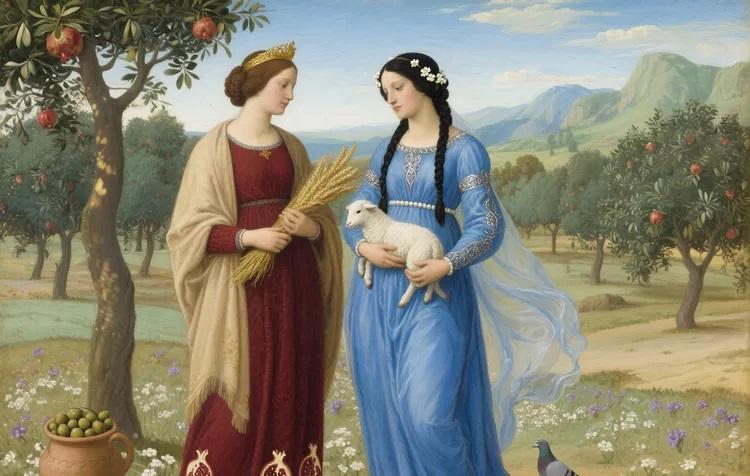Jacob’s Wives Explained: Meet Leah, Rachel, Bilhah & Zilpah

Jacob’s family is a foundational element of biblical history, as his twelve sons became the patriarchs of the twelve tribes of Israel. Central to his family narrative are the women he married—Leah and Rachel—and the two maidservants, Bilhah and Zilpah, who also bore him children. The story of Jacob’s wives is marked by love, rivalry, struggle, faith, and God’s providential hand.
This article examines the lives of Jacob’s wives, their relationships with Jacob, their roles as mothers of Israel’s tribes, and the spiritual and theological lessons drawn from their stories.
The Context of Jacob’s Marriages
Marriage Customs in the Ancient Near East
In Jacob’s time, marriages were often arranged within families or tribes to secure alliances and inheritance. Polygamy was culturally accepted, and it was common for a man to have more than one wife or to take maidservants as concubines to bear children if the wives were barren.
Jacob’s marriages followed these customs, but his family dynamics also reveal deeper spiritual and personal complexities.
Jacob’s Journey to Haran
After deceiving his brother Esau, Jacob fled to Haran, where his uncle Laban lived. Jacob’s arrival in Haran marks the beginning of his relationship with Laban’s daughters, Leah and Rachel.
Leah: The Elder Sister
Leah’s Introduction
Leah was the older daughter of Laban. The Bible describes her as having “weak eyes” (Genesis 29:17), a phrase that has been interpreted in various ways, possibly indicating she was not as physically attractive as Rachel.
The Deception and Marriage
Jacob agreed to work for Laban for seven years to marry Rachel, whom he loved. However, Laban deceived Jacob by giving Leah to him instead on the wedding night (Genesis 29:21-25).
Jacob later married Rachel as well, agreeing to work another seven years.
Leah’s Role as Mother
Leah bore Jacob six sons: Reuben, Simeon, Levi, Judah, Issachar, and Zebulun, and one daughter, Dinah.
Her fertility was seen as a sign of God’s favor, especially in contrast to Rachel’s initial barrenness.
Leah’s Emotional Struggles
Leah’s story is marked by a desire for Jacob’s affection. She named her first son Reuben, saying, “Because the Lord has seen my misery” (Genesis 29:32).
Her struggle for love amidst rivalry with Rachel reflects human longings for acceptance and affirmation.
Rachel: The Beloved Wife
Rachel’s Introduction and Character
Rachel was the younger daughter of Laban and Jacob’s great love. She is described as beautiful and cherished (Genesis 29:17).
Rachel’s Barrenness and Prayer
Unlike Leah, Rachel initially was unable to conceive, which caused her great distress.
She prayed fervently, and God eventually answered by giving her two sons, Joseph and Benjamin.
Rachel’s Role as Mother and Her Legacy
Joseph became a central figure in the Bible, saving Israel during famine. Benjamin was the youngest son, born as Rachel died giving birth to him (Genesis 35:16-20).
Rachel’s story highlights themes of faith, perseverance, and God’s providence.
Bilhah: Rachel’s Maidservant
Bilhah’s Role as Surrogate
When Rachel was barren, she gave her maid Bilhah to Jacob to bear children on her behalf (Genesis 30:1-8).
Bilhah bore two sons: Dan and Naphtali.
Theological and Social Implications
This practice, though culturally accepted, raises questions about family dynamics and God’s sovereignty.
Bilhah’s children were fully recognized as Jacob’s sons and became heads of tribes.
Zilpah: Leah’s Maidservant
Zilpah’s Role and Children
Similarly, Leah gave her maid Zilpah to Jacob, who bore him two sons: Gad and Asher (Genesis 30:9-13).
Influence of Maidservants
Though servants, Bilhah and Zilpah played critical roles in fulfilling God’s promise of numerous descendants to Jacob.
Their stories reflect God’s ability to use unexpected people for His purposes.
The Rivalry Between Leah and Rachel
Competition for Jacob’s Affection
Leah and Rachel’s rivalry over Jacob’s love and childbearing rights is a prominent theme.
Both sought to secure their place in Jacob’s heart and family through children.
Impact on Family Relationships
This rivalry led to complex family dynamics, jealousy, and tension, showing the human side of biblical characters.
Spiritual Lessons from Jacob’s Wives
God’s Sovereign Hand in Imperfect Situations
Despite human schemes and conflicts, God’s promises were fulfilled through Jacob’s wives.
Their story reveals God’s ability to work through flawed circumstances.
Faith and Perseverance
Rachel’s prayer and eventual conception exemplify faith and hope.
Leah’s acceptance of God’s blessings amid hardship teaches contentment.
The Role of Women in God’s Plan
Jacob’s wives were instrumental in the birth of the twelve tribes, showing that women, even in difficult situations, are vital to God’s redemptive plan.
The Twelve Tribes and Their Mothers
Leah’s Sons
Leah’s sons formed prominent tribes, including Judah, from whom King David and Jesus descended.
Rachel’s Sons
Rachel’s sons, Joseph and Benjamin, became leaders of important tribes.
Bilhah’s and Zilpah’s Sons
Their sons formed tribes known for courage and strength, contributing to Israel’s unity.
Conclusion
Jacob’s wives—Leah, Rachel, Bilhah, and Zilpah—played pivotal roles in the unfolding of God’s covenant with Israel. Their stories of love, struggle, faith, and motherhood reflect the complex human realities behind biblical history. Through their lives, God demonstrated sovereignty, grace, and faithfulness.
Their legacy endures in the twelve tribes and ultimately points to God’s redemptive work in Christ.
- Art
- Causes
- Crafts
- Dance
- Drinks
- Film
- Fitness
- Food
- Игры
- Gardening
- Health
- Главная
- Literature
- Music
- Networking
- Другое
- Party
- Religion
- Shopping
- Sports
- Theater
- Wellness



